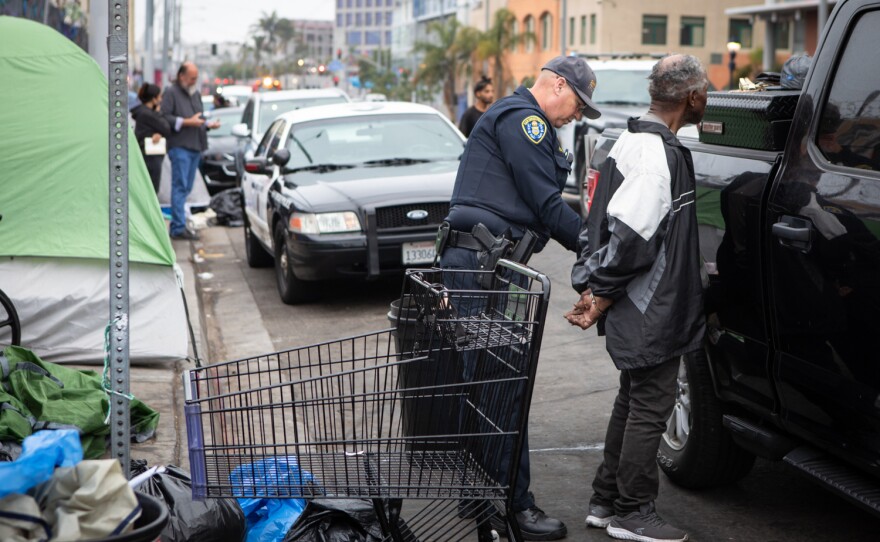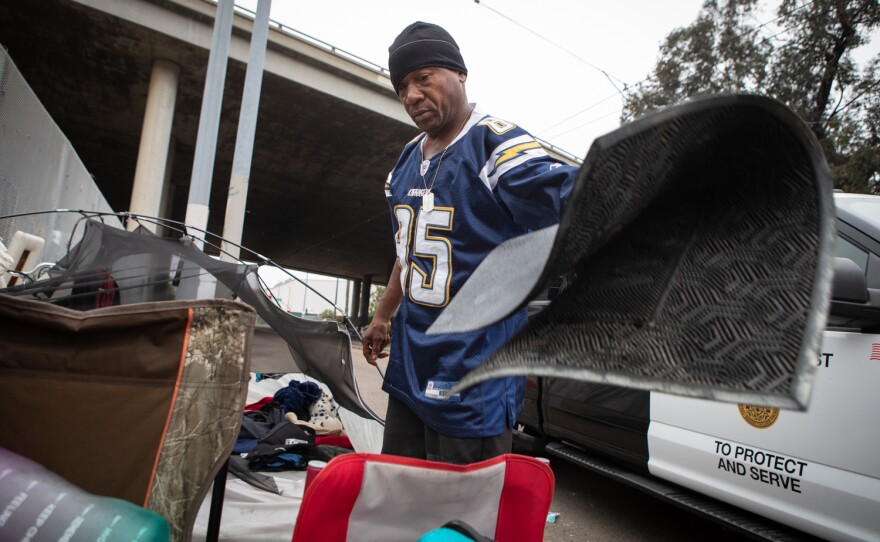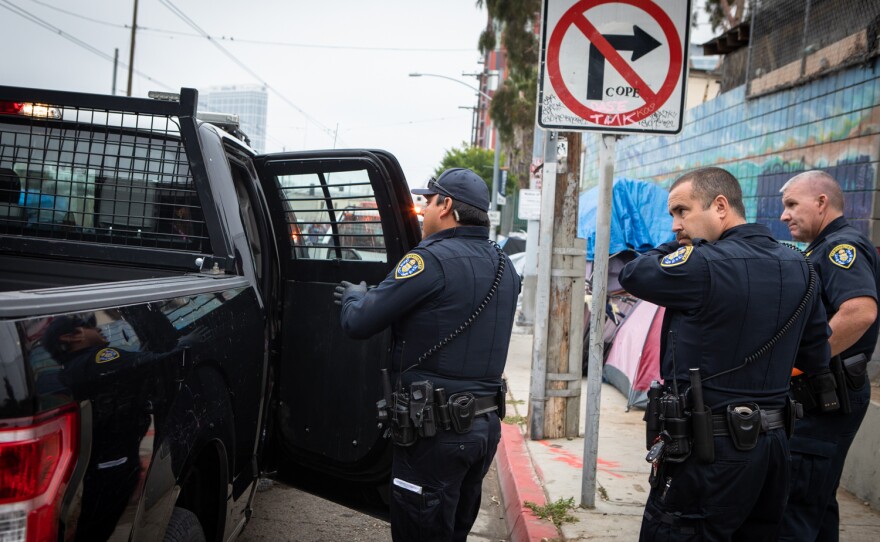San Diego might be running afoul of court orders that dictate how city officials are supposed to clean homeless encampments, discard property and enforce a law about blocking a sidewalk, according to an inewsource analysis and two attorneys who fight for unsheltered San Diegans.
Multiple incidents, both witnessed by inewsource and shared on social media, show city officials breaking the rules when it comes to posting notices prior to cleaning and throwing away property without giving people an opportunity to claim it.
Top city officials are harping on the police department’s use of encroachment — a law that was intended to prohibit trash cans from blocking a sidewalk — to remove homeless people from encampments that they say pose a hazard to pedestrians. In fact, emails obtained by inewsource reveal San Diego police discussed using the law as a tool eight years ago to clear parks and other public spaces for “normal citizenry.”
“Summer and the warm weather are coming and we need to make sure the parks and rec centers are being used by folks they were intended for … kids, families, sports groups and they don’t become transient camps,” reads a 2014 email that was sent from one high-ranking police official to several others.
WHY THIS MATTERS
Estimates show San Diego has at least 4,800 homeless people. Mayor Todd Gloria said solving homelessness is the city’s top priority.
Local attorneys Scott Dreher and Coleen Cusack argue the city’s approach not only violates legal agreements the city has made, but it’s unconstitutional.
“The city’s just flaunting everything,” said Dreher, who has filed four lawsuits over the past two decades against the city for its treatment of homeless people — three of which established rules for encampments and enforcing laws.
“The sweeps are now going whole hog. It’s literally using a giant broom and sweeping people up,” he said, adding that he is preparing to take the city to court again over its treatment of homeless people.
A recent inewsource analysis found San Diego police have made eight times as many arrests for encroachment and illegal lodging through June 3 compared to the same time last year. The number of arrests for these crimes so far has exceeded the total for all of last year, records show.
Mayor Todd Gloria has declined multiple requests for comment, but his staff disputes those findings.
Gloria’s office told inewsource the city consistently follows the rules outlined in legal settlements and, when presented with evidence to the contrary, said it was simply an error that was quickly corrected, or a misunderstanding of the facts by those who witnessed the cleanups.
The mayor’s office also said inewsource’s reporting doesn’t tell the full story. The vast majority of arrests are for outstanding warrants, officials said, but they would not provide specifics about those warrants or any records to back up that assertion.
At any rate, officials said it’s unfair to compare arrests of homeless people this year against last year, because shelters are now “back open to nearly pre-pandemic capacities.” At the same time, they insist stepped-up enforcement for blocking a sidewalk has nothing to do with shelter capacity — it’s about protecting public access, health and safety.
But that’s not entirely true. When pressed on this issue just two weeks ago, Gloria said the city has made major investments in shelter beds and “that has to come with some ability to ask them to use them.”
“If they don’t want to use them,” Gloria continued, “it’s a free country, I understand that. But it’s not without consequences. … If we're going to redefine what's acceptable in terms of our society to include sheltering on the streets, I won't be that guy. I'm not signed up for that.”
Shelter capacity is an important factor for enforcement, because a federal court ruled in 2018 that governments cannot cite and arrest homeless people for “sitting, lying and sleeping in public” when there isn’t anywhere else for them to go.
Cusack, a criminal defense attorney who represents homeless people for free and is working with Dreher to bring a case against the city, said the city’s efforts to expand shelters while also stepping up enforcement should be called out for what it is.
“It’s not to help people,” she said, “it’s so that police can arrest more people.”

Lawsuits have set the rules for San Diego
San Diego has faced legal challenges over its treatment of homeless people at least four times in two decades, and Dreher was involved in all of them.
It started in 2004 when he filed a lawsuit on behalf of homeless San Diegans to challenge the city’s enforcement of illegal lodging, which accused the city of criminalizing people for sleeping on the street when they had nowhere else to go.
That case was settled in a 2011 agreement that allows people to bed down on the sidewalks from 9 p.m. to 5:30 a.m. and generally avoid illegal lodging tickets. As a result, officers are required to offer a shelter bed to each person they encounter before writing a ticket.
Not long after that settlement, high-ranking police officials apparently sent emails discussing how to use encroachment as a workaround to “handle transient issues” in “problem areas.” inewsource obtained copies of those emails and asked the mayor’s office to confirm their authenticity, but officials did not respond by deadline.
Encroachment was supposed to be used against “unauthorized solid waste or recycling dumpsters and bins” that block public access, according to the city ordinance. But a lieutenant with San Diego police pointed out it’s a jailable offense that can be applied to almost any situation — “it is unlawful to erect, place, plant or allow an object to remain” in public spaces, she wrote, citing the law.
“When you see someone’s tent, backpack, shelter, or stuff sprawled in the park, making the space unusable to the normal citizenry, you can use this section,” the now former Lt. Natalie Stone apparently wrote in 2014. “This section can be used any time of the day. Keep in mind that we cannot use illegal lodging from (9 p.m. to 5:30 a.m.) because of an agreement with the (American Civil Liberties Union) over our treatment of the homeless.”
Lt. Andra Brown, who recently retired, forwarded this email to a number of other high-ranking police officials and told them to go over it with their “troops,” according to the documents inewsource obtained. She listed a couple areas of concern, including Jeremy Henwood Memorial Park — dedicated to the officer who had been killed in the line of duty three years prior — and said officers need to ensure it “remains clean and family friendly so it is an appropriate tribute to Jeremy.”
She went on to say officers need to make sure public spaces don’t turn into “transient camps.”
inewsource attempted to reach out to both Stone and Brown to confirm the emails and learn more about how these directives came about, but neither could be reached for comment.
Even so, former San Diego police sergeant Rick Schnell confirmed that using encroachment against people living on the streets became a department-wide strategy, and told inewsource that officials wanted to know how they could clear homeless encampments without getting sued.
The police department was caught in a tough spot, he said. Hundreds if not thousands of calls were coming in about drug activity and other issues related to homelessness downtown.
“You get a lot of pressure to move people off the street or to do something,” said Schnell, who oversaw the department’s homeless outreach team until he retired in 2014. “And so, that was just one of the (laws) that was available in the books.”
The problem is, Dreher said, it’s clear the law isn’t applied equally. The law is so vague that it “literally prevents you from doing anything anywhere ever.”
“So, if you go lie down in the park and read a book, that’s OK,” Dreher said. “But if a homeless guy does it, and you are doing the exact same thing, the city gives them tickets.”
Dreher challenged the city’s use of encroachment in 2017, representing 10 homeless San Diegans in a class action lawsuit. The agreement that followed was intended to strike a balance between access to public spaces for all people, while also ensuring that people without homes are not punished for reasonable use of public space.
As part of the settlement, the city agreed to open a downtown storage center with up to 500 bins for unsheltered San Diegans. Police were also allowed to continue enforcing encroachment anywhere in the city at any time of day, as long as officers follow the “progressive enforcement model,” which allows them to ticket unhoused people for not accepting shelter.
The model has four stages. The first time an unhoused person refuses shelter, they’re given a warning. The second and third refusals will result in a citation. People are arrested when they refuse shelter after the fourth encounter.
Officers are also supposed to enforce encroachment equally to all residents whose property is blocking the public right of way.
But today, there are few if any storage bins available, Dreher said. In addition, expanded shelter capacity coupled with progressive enforcement has led to a sharp increase in the number of arrests compared to last year. And Dreher said it appears that police still aren’t applying the law equally.
This violates the intent of the settlement, even when people refuse shelter, Dreher said, and the city isn’t trying to address those problems.
“They’re just saying, ‘There’s a gray area; give tickets and eventually people will disappear,’” he said, adding that he’s going to ask a judge to weigh in.
All told, arrests and citations for encroachment and illegal lodging are nowhere near pre-pandemic levels, but these enforcement efforts are happening at a time when experts are bracing for the latest surge in COVID-19 cases, and not long after San Diego was given the title of least affordable housing market in the nation.
‘You can’t just throw people’s things away’
inewsource began monitoring the city’s approach to encampments in March, following several posts on social media from homeless advocate Michael McConnell that accused city employees of breaking the law during cleanups.
One post, in particular, showed a video of sanitation crews throwing a tent into a garbage truck with the caption, “The @CityofSanDiego just threw away this home and all the belongings inside without even looking through them.”
Courts across the country have ruled that homeless people are entitled to their personal belongings. But San Diego is bound by another legal agreement that spells out the rules for cleaning up — or abating — a homeless encampment.
The city’s Environmental Services Department is required to post a three-hour notice prior to cleaning, and if any property appears abandoned, workers are supposed to go through each item and determine if it meets the threshold for impound. Officials initially said that threshold is:
- Valued at $100 or more
- Irreplaceable personal items
- Important documents
- Medicine
Dreher said this is a violation too because the city’s threshold leaves out one key criterion from the settlement: Any items that are “saleable, usable or otherwise appear to be of value to the owner.”
Value can change from person to person, especially when it involves someone who lives on the street. Officials are supposed to collect anything that could be used by its owner, store it and post a notice of where it is, giving the owner an opportunity to collect it.
Records from the first five months of this year show sanitation crews conducted 611 cleanups, discarding more than 660 tons from encampments, while only deeming property worthy of impound six times.
It shows city officials are just discarding homeless San Diegans’ property rather than storing it as required, Dreher said.
“The city isn’t even pretending to look at stuff and keep it,” he said. “You can’t just throw people’s things away.”

In addition, inewsource has found two instances of officials violating notice requirements.
Several areas throughout downtown have street signs indicating regular cleanup days — for example, the city will come to clean one side of a street every Monday, Wednesday and Friday, and the other side every Tuesday and Thursday. Even in those areas, officials still have to post a three-hour notice prior to cleanup.
Two weeks ago, on a Thursday morning, an inewsource reporter witnessed San Diego police enforcing encroachment on a downtown sidewalk. Without posting any notice, sanitation crews went through and cleaned the same sidewalk immediately after, even though it had a street sign showing Monday, Wednesday and Friday cleanups.
During that sweep, crews discarded two shopping carts filled with valuable items, including clothes and hygiene products. The workers didn’t appear to make any effort to look through them or identify who they belonged to before they went in the garbage truck. A woman who appeared to be the owner returned about a half an hour later, asking where all her stuff went.
A city spokesperson initially said crews were only there to support police who were enforcing encroachment and to clear any unwanted property or waste — essentially saying the settlement agreement doesn’t apply in these situations. But when pressed on this, the spokesperson doubled down, saying police and sanitation crews are aware of the rules and following them each time.
Earlier this month, McConnell published multiple examples on a Wednesday that show official three-hour notices posted in areas designated for Tuesday and Thursday cleanups. When asked about this, city officials said it was an error that was corrected within a couple hours.
The city doesn’t keep information on these kinds of mistakes, officials said, because it doesn’t happen often.
Sitting, lying and sleeping in public
San Diego is also bound by another case, but this one stems from a 2018 federal court ruling out of Boise, Idaho.
That lawsuit — Martin v. Boise — challenged the city’s camping and disorderly conduct laws that prohibited residing and “occupying, lodging or sleeping” in a public space.
A three-judge panel from the 9th U.S. Circuit Court of Appeals ultimately ruled that as long as there are more homeless people than available shelter beds, governments “cannot prosecute homeless individuals for involuntarily sitting, lying and sleeping in public.”
The ruling cites another court’s opinion that says, “resisting the need to eat, sleep or engage in other life-sustaining activities is impossible. Avoiding public places when engaging in this otherwise innocent conduct is also impossible.”
The court upheld that enforcement of these ordinances without an accessible alternative is a violation of a homeless individual’s constitutional rights.
Accessible alternatives must take into consideration barriers for entry into a shelter, such as religious affiliation and caps on length of stay, the ruling says. Advocates say other barriers include curfews that interfere with employment, and even physical disability that would prevent someone from accessing a top bunk.
The court’s opinion doesn’t cover those who have access to suitable alternatives but choose not to use them. But the dormitory-style environment of “congregate shelters” alone could be a barrier to some, and San Diego has only four alternative options with very limited bed capacity.
The majority of the city’s homeless shelters are in this congregate setting, meaning people are essentially packed into a warehouse with bunk beds. Advocates and researchers across the country say these shelters are less than ideal as they provide little in the way of specific accommodations and offer little to no privacy, independence or dignity.
The city is paying to operate nearly 1,500 beds, and since April, the vast majority have remained full, according to the San Diego Housing Commission.
“People with no place to live will sleep outside if they have no alternative,” 9th Circuit Judge Marsha Berzon wrote in an order denying a new hearing. “Taking them to jail for a few days is both unconstitutional, for the reasons discussed in the opinion, and, in all likelihood, pointless.”

Researchers have also found this to be the case — policing-led approaches to tackling homelessness are ineffective.
An article published last year analyzing San Francisco’s homeless services argued that shelter beds are used as a tool by police to arrest, cite and confiscate property of unhoused people under the guise of public health.
Legal questions aside, Cusack questions the morality of forcing someone to choose between a homeless shelter and jail — “Both of which are spreading Covid,” she said.
To understand why someone might not want to go into a homeless shelter, you really need to put yourself in their shoes, said Greg Anglea, CEO of Interfaith Community Services, a nonprofit homeless service provider that operates shelters in North County.
“So first off, that person may not even have shoes. They might be barefoot out in the elements,” he said, adding that a number of different factors lead to homelessness, and they sometimes involve significant traumas.
A catalyst could even be rejection from family for sexuality, political affiliation or any other reason, destroying a person’s safety net or support system.
But for every person living on the street today, they have not found a shelter or resource that works for them and their needs. Shelters can be a scary place for someone living with trauma, mental illness or substance abuse disorder, Anglea said.
“If they had, they wouldn’t be homeless,” he said. “They’re living in an encampment or they’re living on the streets because those shelter resources have not worked.”
“So why should an individual think that that’s going to change today?”







